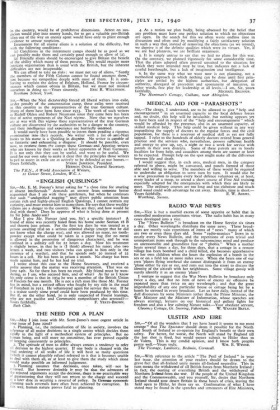THE NEED FOR A PLAN
SIR,—May I join issue with Mr. Scott-James's most cogent article in your issue of June 22nd? I. Planning, i.e., the rationalisation of life in society, involves the reference of all major decisions to a single centre which decides them rigidly in the light of a methodical system of principles. But no human being, and still more no committee, has ever proved capable of keeping consistently to principles.
2. The aptitude of men to differ always creates a tendency to refer all decision to the highest quarter. If one body is charged with the final ordering of all walks of life it will have so many questions (which it cannot plausibly refuse) referred to it that it becomes unable to deal with them all, or at least to give them the study which alone would make possible an informed judgement.
3. Planning assumes that . decisions, once taken, will . not be reversed. But however desirable it may be that the advocates of the rejected arguments accept the-deeisioni-tbere is :no practicable-way of guaranteeing that they will not return to -the charge and succeed at a later date in securing a reversal of policy. In German economic planning such reversals have often been achieved by corruption. In this way, human nature proves fatal to planning. 4. As a nation we plan badly, being obsessed by the belief that any problem must have one perfect solution to which no objections are open. In the search for this we often waste endless time in discussion and often end by modifying a fairly satisfactory solution in such a way that, instead of removing the objections (as we intend), we deprive it of the definite qualities which were its virtues. Yet, if we are bad planners, we are brilliant organisers.
5. It is simply untrue to say that we laid no plans for this war. On the contrary, we planned vigorously for some considerable time. That the plans adopted often proved unsuited to the situation for which they were intended may be true, but indicates not a lack of careful forethought, but a lack of imagination and intelligence.
6. In the same way what we want now is not planning, not a methodical approach in which nothing can be done until first prin- ciples are settled by the highest authorities, but delegation of authority, disregard of precedent and spontaneity of initiative, in other words, free play for leadership at all levels.—I am, Sir, yours


























 Previous page
Previous page